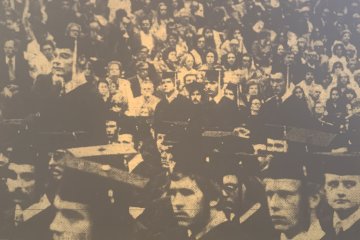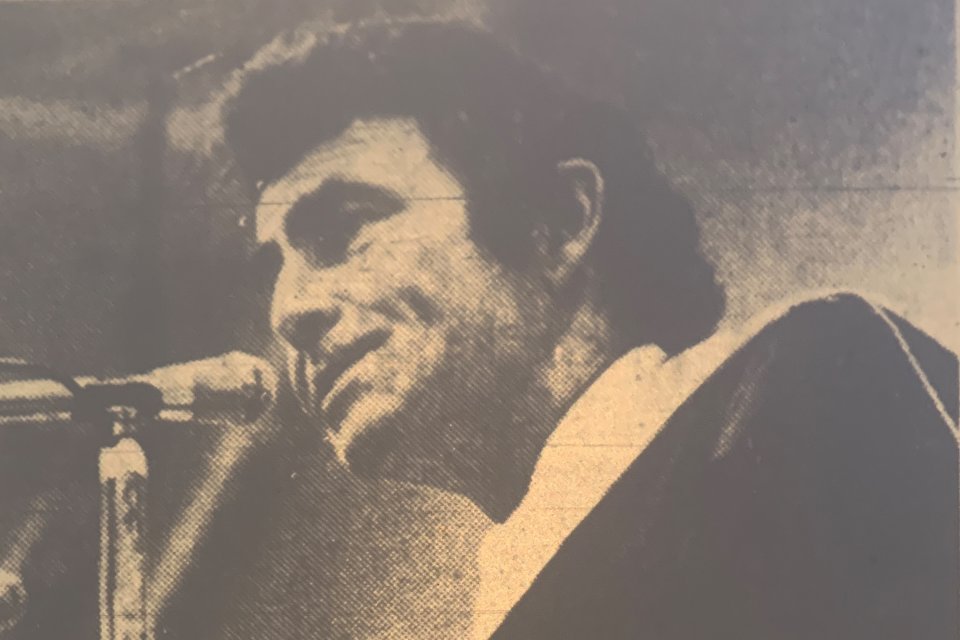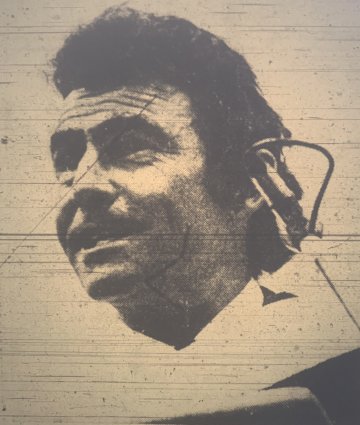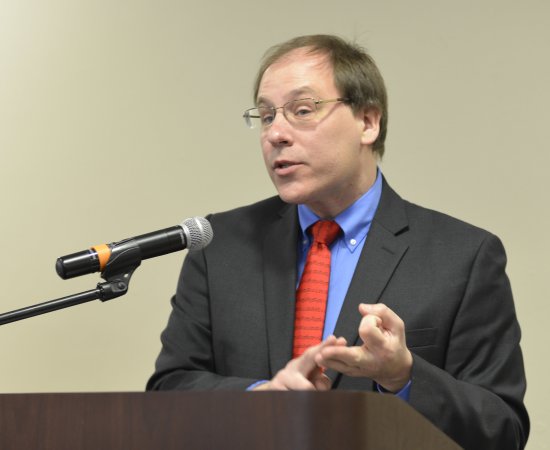
Pioneer Past: Utica gets a visit from The Twilight Zone

For all the thrills and suspense that Syracuse-native Serling delivered to viewers on the classic TV series, there was nothing spooky about his appearance at Utica University (then-Utica College) in 1973.

You’re traveling through another dimension, a dimension not only of sight and sound, but of mind. A journey into a wondrous land whose boundaries are that of imagination. This trip will take you to a place called Utica. A trip not only into the past, but into the very depths of…the Twilight Zone.
It was like Halloween every week from 1959 to 1964 as the anthology series hosted by creator Rod Serling aired on television screens, providing stories that ranged from fantasy to science fiction, to horror, with characters finding themselves in the middle of unusual or disturbing events, often with a twist ending and an accompanying moral. From monsters on the wings of airplanes, to talking children’s toys, to the McCarthy-ism era fears that turned neighbor against neighbor, there was nothing at the time quite like The Twilight Zone on television.
For all the thrills and suspense that Syracuse-native Serling delivered to viewers on the classic TV series, there was nothing spooky about his appearance at Utica University (then-Utica College) in 1973.
“We are doubly proud that our speaker is one of the most distinguished and influential writers of our time and a native of Central New York,” said then-Utica President Ambrose J. De Flumere, referring to Serling as had “more than any other writer since Ernest Hemingway, become the symbol of the writer as the exciting spokesman of his generation.”
But the U.S. Army veteran and multiple-award winning writer of radio, television, and movies thought himself to be an unusual choice for a commencement speaker.
“Controversy isn’t necessarily my bag,” Serling said. “I’m not an argumentative man. But in truth, on this May afternoon of 1973, how can anyone not involve himself in controversy? Not in some manner find himself as either an advocate or an adversary?”
Speaking at the institution’s 27th Commencement ceremony, the famed writer had his finger on the pulse of the times and current events, speaking of his outrage at the U.S. government’s policy in Vietnam and its involvement in the Watergate break-in by President Richard Nixon’s men.
Members of a group associated with Nixon’s 1972 re-election campaign were caught burglarizing and planting listening devices in the Democratic National Committee headquarters at Washington, D.C.’s Watergate complex.

“We are told somewhat plaintively by no less personages than Henry Kissinger and Governor Ronald Reagan of California that the men who are involved in the current Watergate scandal should be treated with some consideration and respect – not for what they’ve done, but for what motivated them.”
“A little charity has been called for. A little understanding A little quality of mercy. But charity, understanding and mercy apparently are reserved for thieves, liars, and arrogant night crawlers – not pained and anguished young men whose revulsion against death took the form of civil disobedience.”
It should come as no surprise that the man who presented television plays about the power of knowledge and those who’d like to suppress it (such as in classic Twilight Episodes “Time Enough at Last” and “The Obsolete Man”) would use his voice to speak fervently against censorship by those in power during such a tumultuous time as the Vietnam War.
Serling noted several “moral inconsistencies,” among officials at the time, including “the selective sanctimonious morality of men who would muzzle, censor, gag and burn all that which offends them in the way of promiscuity and sex.”
“But we have no comparable concern for the effect of promiscuous violence; men who somehow never acknowledge that the psyche of the young might be more damaged by seeing what comes out of a rifle barrel than by seeing what goes on a mattress in a motel.”
Serling urged the class of 1973 to “Love your country. Feel affection for it. Give it loyalty. Give it support. Help strengthen it. But at some future time when someone should ask you to prove your patriotism and loyalty and affection for that native land – remember that this proof cannot always be equated with a willingness to die or a willingness to kill.”
More Stories

The Ideal Co-Author
Grace VanEtten ’26 is handpicked by Professor Christopher A. Riddle to share authorship in prestigious bioethics journal

Utica University Opens New State-of-the-Art Cyber Range
Utica University faculty and students, along with dignitaries and industry partners, marked the opening of the University’s new state-of-the-art Cyber...

Women’s Sports Receive More Primetime Broadcast Olympic Coverage Than Men’s Sports For The Sixth Olympiad In A Row, Seventh Overall
Women’s sports received more coverage than men’s sports during NBC’s primetime television broadcast of the 2026 Milan Cortina Olympic Games,...
I would like to see logins and resources for:
For a general list of frequently used logins, you can also visit our logins page.
